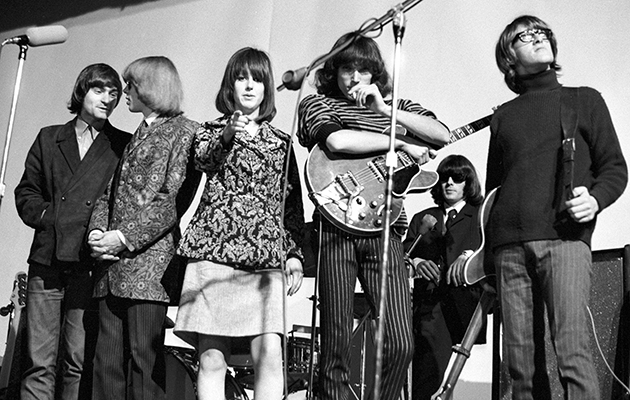BLESS ITS POINTED LITTLE HEAD
RCA, 1969
Fierce live album, recorded in 1968 at Fillmore East and Fillmore West.
KAUKONEN: I think that’s a great live album. I’ve heard some cuts from that recently, and I thought, ‘Wow, we were pretty good.’ It shows the Airplane at the peak of our creative existence. It was an exciting time. New York was always so exciting. As an American artist, that’s where you feel you’ve done good. In some ways it shows what the band was more than the studio records.
CASADY: It really showed how we were playing; we were changing the style of music and the songs we’d recorded just a couple of years earlier, we’re a lot more aggressive, and a lot more experimental than in the studio. You know, I downloaded that album on my iPhone last month, and I was doing an eight-mile run along the Hudson River, and “Bear Melt” came on, and I don’t think I’d listened to it since we recorded it. It sounded familiar, and I stopped by the 42nd Street Pier. I looked to see what it was and went, “Wow.” I listened to the whole thing, and I heard me doing some playing that I couldn’t do today if my life depended on it. I really was taken aback with how passionate and forward we were with our music then. What we were about was the live band, that’s where we took our chances. I thought that was the peak of Jefferson Airplane. And right on the other side of the peak is the demise.
__________________________
BARK
GRUNT, 1971
Marty Balin leaves, Joey Covington takes the drumstool, Kaukonen and Casady’s side-project Hot Tuna gathers pace. And the Airplane start a record label.
KANTNER: We lost Marty. But we were also a good enough band to carry on without him.
KAUKONEN: I was beginning to lose focus with the Airplane. The magic that made it possible to make that music be the sole group goal, for me, was starting to dissipate. Marty founded the band, and without him, in some respects, it lost its way. Was it not quite the Airplane after that? I’d agree. We had obligations, we had to make records, and the business was starting to become more important than the music. And with Grunt Records, our eyes were bigger than our stomachs – The Beatles had a record company, we needed one, and we were utterly unequipped to deal with these things. Grunt helped hasten the demise of the Airplane.
CASADY: Joey Covington had come into the band, Spencer [Dryden] had left. Jorma and I’d done our first Hot Tuna album in ’70. Bark was where we put together all the approaches. It didn’t have the cohesiveness the other albums had. With Joey’s personality, and Marty’s loss, it was a different band. It had run its course. Going back into the band from Hot Tuna, it was almost like, what for? People came in with their own little cliques. There wasn’t a lot of passion in it. Jorma’s “Third Week In The Chelsea” says it all in the lyrics. That’s the story of us all spending three weeks in the Chelsea Hotel, and coming to grips with the weight of all these years there’d been, and how we had all been at it non-stop since 1965. I mean, every day.



